This was not a church I planed on visiting but I had a chance to go and visit on morning so I felt it was rude not to take the opportunity. History on the church seems hard to find but here is some I came across.
"The church dates from the 13th Century (with alterations and remodelling from the 15th and 19th Centuries), it is suspected the origins of the church may date back as far 1000AD. It also had a Ghost
Mary Blandy’s ghost has “meandered around, walking beside the river, in the graveyard, and standing under an old mulberry tree in the garden of the house where she lived”. Mary Blandy, the poisoner of Henley on Thames was executed for murdering her father on Monday 6 April 1752. She was buried in the early hours of the following day at the Parish Church of St Mary the Virgin, between the graves of her parents. The burial service was conducted by Rev William Stockwood and the graves of the Blandy’s can no longer be traced after restoration work on the church."
In cannot say I am happy with the photo's I took this day as I did not take my Tripod along and a lot of the photos were taken with my compact of handheld with the DSLR but I hope the ones I took show a little of what the church is like

I came along to the church around the back way and walked through the churchyard
The tower looks as impressive which ever way you see it.
You pass by the North aisle with its disused porch

Most people will see the Church from the West end as you walk up from the market place
The South aisle is right beside the road and the East end is just an access to the Chantry house

The Main entrance is in the west end though there is an older one that would have taken you in the South aisle chapel
Inside I found the church a little dark but then it was raining outside
Looking down the nave you are drawn to the mural above the chancel arch in front of which is a rood on top of a screen

The chancel shows the choir stalls and altar

The walls are painted
along with the chancel ceiling
Looking back to the rood screen

Above the altar with it's screen and chancel window
Right is the Lady Chapel
Left is The Du Mouriez funerary monument location in the Jesus chapel
A marble pulpit which is entered through a doorway that looked like it once took you to a rood loft
gives this view down the Nave and South Aisle
Turning to the right and you look down the aisle of the Lady chapel, the North aisle is now partitioned off as a vestry
Above the rood which is not original but made no doubt in Victorian times.
Left This may hav ebeen part of an organ but looking behind you see a doorway, a sure sign the church had a rood loft in the past
Across in the lady chapel is a gate
which takes you to St Leonards Chapel, this is the oldest part of the church

It is lit by stained glass windows that look older than they are, I was told they were Victorian
None the less the stained glass is beautiful
Right what looked like an old chest let in the wall with a safe
In the South chapel you can see this beautiful chandelier

There are a few memorial along the walls of the wealthy people who worshipped in the church in the past
Brakspear was was a local brewing family, the brewery was near the church
Tomb of Elizabeth Bacon
Inscription on her tomb in Latin
Above the rood with mural in the background
It is well worth taking in the Stained Glass windows in the church

Most of them are along the South Aisle which you can see
This one is in the glass Creche area
along with this one on the West end of the aisle

Above in the Lady chapel on the North wall

Above the East end window with right the Lady Chapel
Looking high up
along the nave
more stained glass can be viewed on both sides

Up at the end of the Lady chapel aisle the font is in an alcove with many memorials on the walls
The top of a sarcophagus is by the West wall
with this chest on the North

The font is Victorian along with the stained glass
Right one of the embellishments in the corner
This is the ceiling of the alcove

Looking out you look towards the Lady Chapel.
Left the memorial commemorating the first world war you and also see the roll in the chancel and along the Town Hall wall
Above the font along with all the memorials on the walls

Above the shrine on the left is in the South asile along with the Lectern
Right a Squint or as I found out a Hagioscope
The children's creche in the South aisle
View across to the South aisle
The churchyard outside is a lot lager than you think, this part is near the Almshouses on the far end of the churchyard
The graves go back quite a way
and line the path on either side
intermittent in places
I always find it amusing that they built almshouses near the churchyard, these over look the nearby graves
One path here leads though the churchyard towards Church Avenue where there are a row of almshouses. Never realised there were some there, the other path takes you to the chantry house
By the path leading to the Chantry house are cremation memorials
The Chantry house is the oldest building in the town dating back to around 1500 Henry VII was on the English throne
There are more old headstones here and an unusual tomb
I found it interesting to see this simple wooden cross marking the grave of Sir Leslie Dalton Morris
which did not seem fitting of someone with that name
Right a tomb with head and footstones
These are near the Almshouses most people know near the church
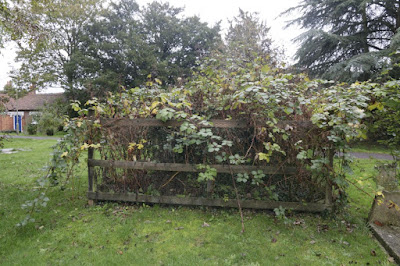
Tomb fenced off with chicken wire
This one was the same only full of brambles
Unusual headstones with more conventional
Another couple of tombs with head and footstones
situated on the North East side of the church
Over towards the North West side
Tomb covered in Ivy
This marker stands out and is most visited
It belongs to Dusty Springfield
She was a singer I remember from when I was young, she lived out her final years in the town. RIP
Till next time I wish you all a wonderful weekend



























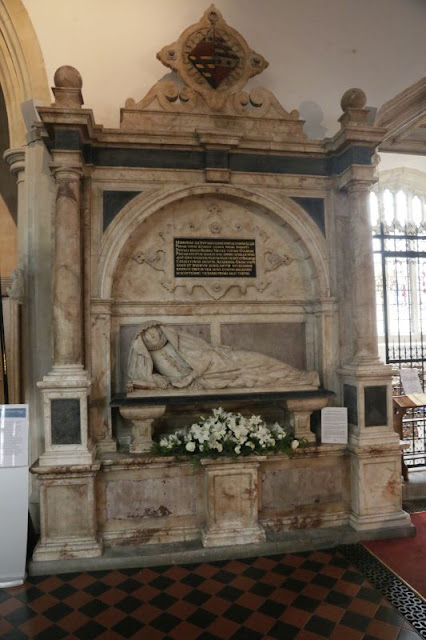

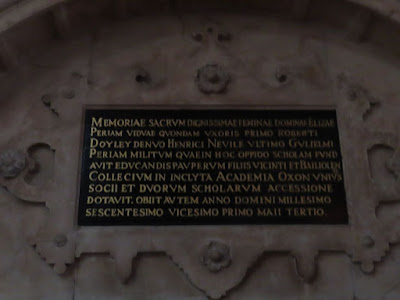




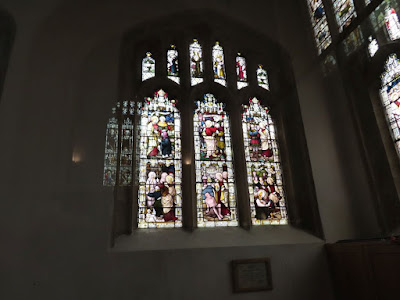




















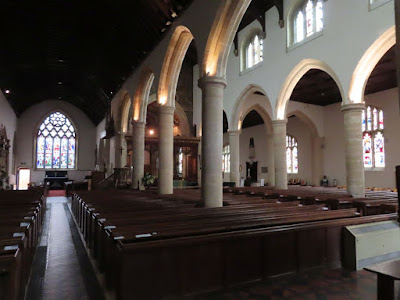












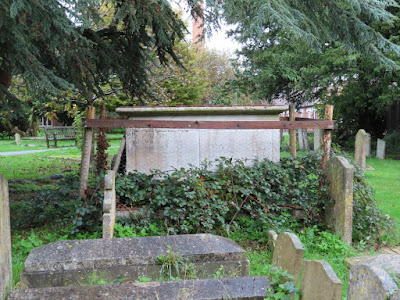









14 comments:
You did an incredible description of the church, pointing out so many amazing things.
Do they still use the alms house?
I also remember Dusty Springfield very well.
...Bill, the window have to be the crowning touch to this beautiful church. Thanks for sharing it.
The stained glass is beautiful.
Love Dusty's music, wonder if anyone has seen the ghost of Mary?
That is a great tower and the interior is interesting. Love the stained glass!
Thanks for sharing you photos of St Mary's, Henley-on-Thames as I've never been inside although have visited the town many times. I see that you left a message today about your blogs and as far as I can see this blog is as usual and the photos are there.
Yes though I did not realse she lived around there till she died
Your right about that
Very much so
No doubt some one will have
It is rather nice
I hate to think how many times I've passed it and not visited, worst part is I only live 12 miles away
St Mary's is lovely Bill, as always you show us the beautiful details. Love the Poppy Memorial. We lived in a village not far from Henley called Wargrave for a year before we came to Perth, enjoyed popping into Henley very much ✨
I have seen this church from the outside, and even walked past it once but parking in Henley is so hard that I don't generally go there. I will make the effort another time, since it looks as if it is a real treasurehouse of High Victorian decoration (even though the church is obviously far older than then.)
Post a Comment